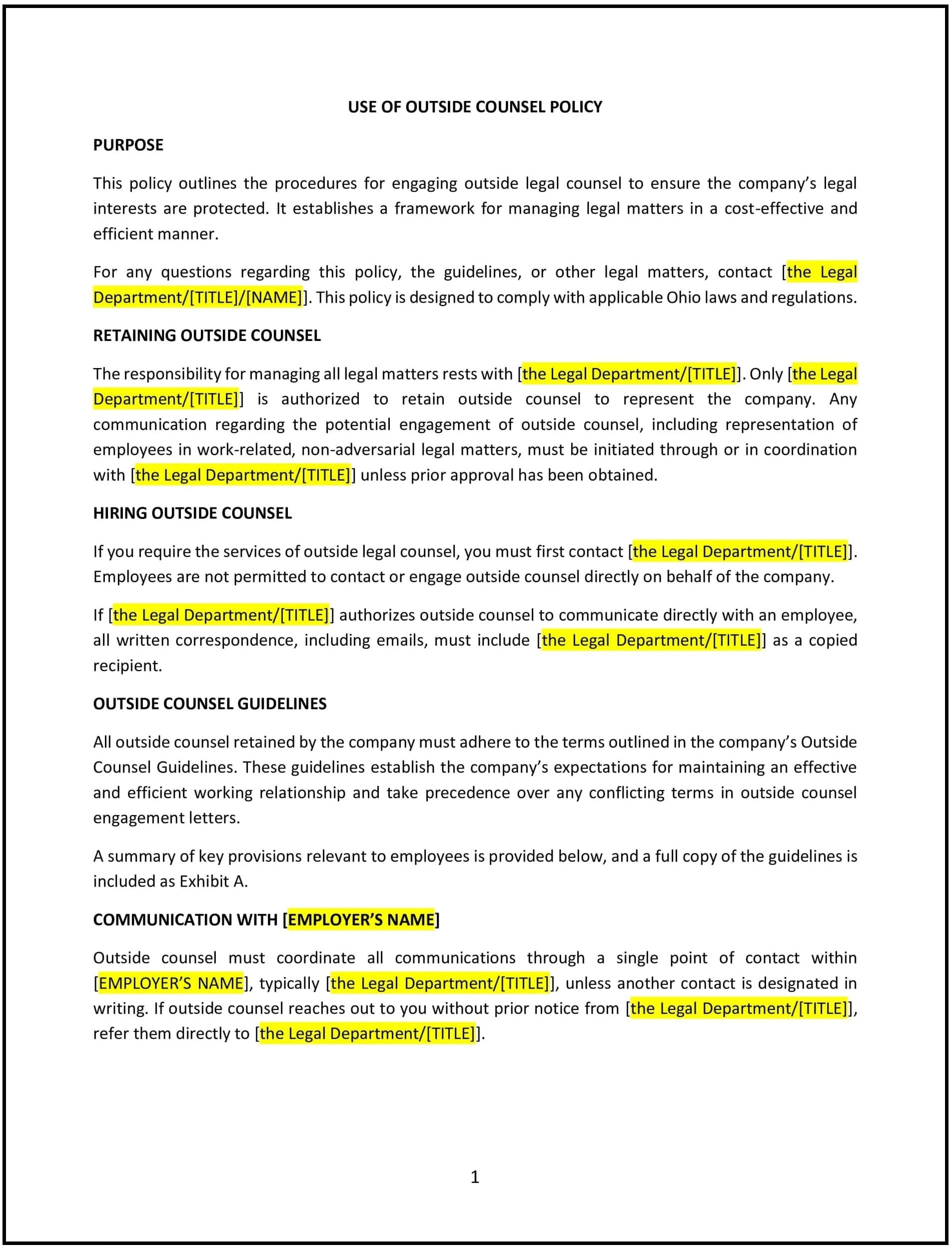Use of outside counsel policy (Ohio): Free template
Got contracts to review? While you're here for policies, let Cobrief make contract review effortless—start your free review now.

Customize this template for free
Use of outside counsel policy (Ohio)
A use of outside counsel policy outlines the guidelines and procedures for engaging external legal services in Ohio businesses. This policy establishes the criteria for selecting outside counsel, the approval process for hiring legal representation, the scope of work for external attorneys, and the responsibilities of both the business and the outside counsel. It ensures that the engagement of outside counsel is in the best interest of the business, complies with relevant laws, and is managed efficiently.
By implementing this policy, Ohio businesses can control legal costs, maintain consistency in legal matters, and ensure that outside counsel is appropriately engaged to address specific legal needs.
How to use this use of outside counsel policy (Ohio)
- Define the scope of engagement: The policy should specify the types of legal matters that may require outside counsel, such as complex litigation, specialized legal expertise, regulatory issues, or large transactions. It should clarify when in-house counsel may refer matters to external attorneys.
- Establish approval procedures: The policy should outline the process for seeking approval to hire outside counsel, including who in the business (e.g., legal department, senior management) is responsible for authorizing the engagement and the factors to consider when selecting counsel.
- Set criteria for selecting outside counsel: The policy should define the criteria for choosing outside counsel, including qualifications, expertise, reputation, past experience with similar matters, and cost-effectiveness. The policy may also encourage diversity in selecting firms or individuals.
- Define responsibilities of outside counsel: The policy should outline the specific duties and responsibilities of outside counsel, including the scope of legal services to be provided, communication protocols, and timelines for delivering legal advice or services.
- Address fee structures and billing: The policy should provide guidance on acceptable billing arrangements, such as hourly rates, flat fees, or contingency fees, and specify expectations for transparency in billing practices, including detailed invoices and billing cycles.
- Ensure conflict of interest checks: The policy should emphasize the importance of conducting conflict of interest checks before hiring outside counsel to ensure that no conflicts arise between the business and the attorney or firm.
- Monitor outside counsel performance: The policy should explain how the business will monitor the performance of outside counsel, including reviewing their work, assessing whether legal services are delivered within the agreed timeline, and evaluating the cost-effectiveness of their services.
- Review and update regularly: The policy should be reviewed periodically to ensure it aligns with Ohio state laws, federal regulations, and evolving business practices, ensuring the engagement of outside counsel is handled in a manner that is consistent with the business’s legal needs and goals.
Benefits of using this use of outside counsel policy (Ohio)
This policy provides several key benefits for Ohio businesses:
- Controls legal costs: By establishing clear guidelines for hiring and managing outside counsel, the policy helps businesses control legal expenses by ensuring that outside counsel is used appropriately and efficiently.
- Ensures consistency in legal representation: The policy promotes consistent and strategic use of outside counsel, helping the business avoid unnecessary duplication of legal efforts and ensuring that all legal matters are handled in a coordinated manner.
- Enhances legal expertise: Engaging outside counsel allows businesses to tap into specialized legal expertise that may not be available in-house, providing better representation in complex or niche legal matters.
- Reduces legal risks: Clear procedures for selecting and managing outside counsel help mitigate the risks associated with legal representation, such as conflicts of interest, poor performance, or excessive billing.
- Improves efficiency in legal processes: A well-defined policy ensures that legal matters are managed more effectively by ensuring that outside counsel is engaged only when necessary and that work is performed in a timely and cost-effective manner.
- Strengthens business relationships: By selecting the right external legal partners and maintaining clear communication, businesses can build long-term, productive relationships with outside counsel that benefit both parties.
Tips for using this use of outside counsel policy (Ohio)
- Communicate the policy clearly: Ensure that all relevant employees, such as in-house counsel, management, and finance staff, are familiar with the policy and understand when and how to engage outside counsel.
- Ensure proper approval: Before engaging outside counsel, employees should follow the approval process outlined in the policy, including obtaining authorization from the appropriate internal stakeholders.
- Track legal expenses: Keep track of the legal costs associated with outside counsel by regularly reviewing invoices and comparing them to the original budget or agreement. This helps ensure that the business stays within its budget for legal services.
- Negotiate favorable terms: Work with outside counsel to negotiate reasonable fee arrangements, including transparent billing practices and clear timelines for legal services. Ensure that all terms are documented in an agreement.
- Monitor performance: Regularly assess the quality of the work provided by outside counsel to ensure it meets the business’s expectations. This includes evaluating the timeliness, cost-effectiveness, and overall quality of the legal services provided.
- Maintain records: Keep detailed records of all engagements with outside counsel, including contracts, invoices, performance reviews, and communications, to ensure that all legal services are properly documented.
- Review the policy periodically: Regularly review the policy to ensure it is up to date with Ohio state laws, industry standards, and the business’s legal needs. Make necessary updates to reflect changes in business operations, legal requirements, or best practices.